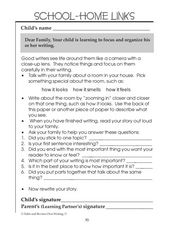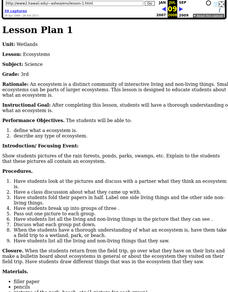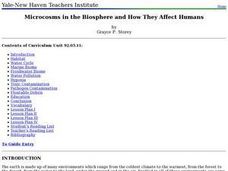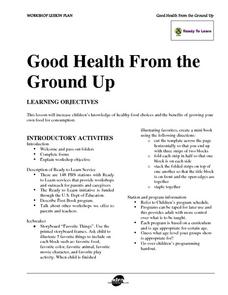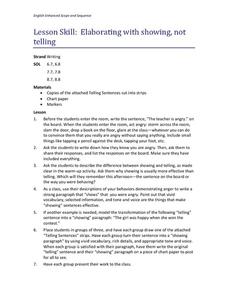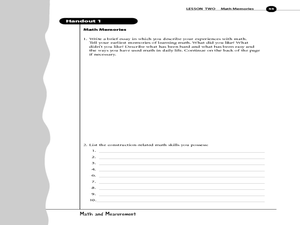Curated OER
Learning to Organize Writing
Encourage focus and organization in the writing of your second, third, and fourth grade classes. Learners are asked to select a room in their house and narrow in on how it looks, smells, or feels. After writing a short paragraph...
Curated OER
Taming Wild Land
Third graders consider the habitat needs of living things and how extensive farming in an area can affect the plants and animals of a region. They participate in a simulation to show how changing the habitat in one area can greatly...
Curated OER
Wetlands
Third graders examine how an ecosystem is a distinct community of interactive living and non-living things.
Teacher Web
Poetic Sound Devices
As part of a study of poetic devices, kids are asked to identify the assonance, consonance, and alliteration found in a series of lines of poetry, and then identify the rhyme scheme and the types of rhyme found in Poe's "Annabel Lee,"...
Curated OER
Science: Microcosms in the Biosphere
In a series of lessons, examine the impact on humans by microcosms in the biosphere. Among the plans structured for students with different abilities and learning styles, are activities describing the symbiotic relationship, drawing the...
Curated OER
Going Nuts for a New Grade
Students describe the practices they follow to get ready for a new school year. Using those practices, they create a list of resoultions that they might improve on during the new year. They complete a worksheet and share their answers to...
Curated OER
Good Health from the Ground Up
Students examine healthy food choices and the benefits of growing their own food for consumption. They read the story "Favorite Things" and illustrate 5 favorite things. Students discuss types of foods that are healthy choices and why it...
Curated OER
All About Kennings
The word kenning is derived from an old Norse phrase. It means, "to express a thing in terms of another." Pupils practice identifying and using kennings in the modern English language. This presentation was produced in Britain, and has a...
Virginia Department of Education
Elaborating with Showing, Not Telling
This engaging activity is a great change of pace for the classroom. The activity starts with a simple message on the board “The teacher is angry.” The instructor is to stomp around, drop books and glare—anything to show anger. The...
Curated OER
Elmer by David McKee
Young scholars explore individual differences. In this literacy and self-esteem lesson, students listen to the story Elmo by David McKee, then describe what characteristics make Elmo special. Young scholars complete a T chart showing how...
Curated OER
Fruit Writing
Students who have recently learned about similes and metaphors practice putting them in their writing. They get a better understanding of how similes and metaphors can be used by practicing the usage of them in their own personal...
Curated OER
Internet Scavenger Hunt
Learners use a computer and the internet to click on highlighted words to find certain answers. They then write the answer to the questions on paper. Finally, students choose one animal to write about. They research the animal on the...
Curated OER
Lesson Plan 8: Setting and Mood
What mood does this story evoke? How are setting and mood linked? Young novelists explore the different emotions brought about by writing, starting by journaling things that inspire their own feelings. Examine the word mood, looking into...
Curated OER
Expressing Ideas
Before a child can write in detail, he/she needs to be able to identify what the details are. To build an understanding of how to add or express details in describing an object, place, or person, learners match the detail cards to the...
Curated OER
Legal Forms of Business
Have your budding entrepeneurs explore the businesses in their community and determine what legal form each of businesses are. They discuss the rationale for determining a legal form of business and then write a paper that describes a...
Curated OER
Acid (and Base) Rainbows
Students are introduced to the differences between acids and bases and how to use indicators, such as pH paper and red cabbage juice, to distinguish between them. They make predictions that can be answered through scientific...
Curated OER
Similes and Metaphors
Pupils examine poetry to identify the use of metaphors and similes after the teacher defines what they are. They decide how they can use similes and metaphors to describe different pieces of fruit. Finally, they write poetry about the...
Curated OER
Penguin Writing
After discussing the main events in Mr. Popper’s Penguins, young writers describe in sequence what they would do if they had 12 penguins living in their house. The narratives are then glued onto a penguin cut-out, mounted on construction...
Curated OER
Sea to Sky Adjectives Booklet
Adjectives build better sentences! First, second, third, and fourth graders design adjective booklets that feature words to describe everything between the sea and the sky.
Curated OER
Math Memories
Students discuss their math experiences from the past. In this math lesson, students write to describe their experiences in math. Additionally, students list math skills that they have.
Curated OER
Newton's Laws of Motion
Ninth graders utilize Newton's Laws of Motion to explain how things move, create poster illustrating each law of motion, and present and explain their poster to classmates.
Curated OER
This is My Neighborhood
Students predict the things that they may see, smell, or hear in their neighborhood. They take part in a neighborhood walk, creating a rough map of their neighborhood as they go. Upon return to the classroom, students create a final map...
Curated OER
Step Into the Past: Change and Growth in Arkansas
The concept of change over time is presented in this history instructional activity. In it, learners discuss how some things stay the same over time, while other things change. Teams of students research and create a timeline of...
Curated OER
Follow a Fish
Students choose a fish from anywhere within the Ocean Center. They observe it for a given time, recording its behavior. Students comprehend the concept that living things have individual characteristics that enable them to live in their...
